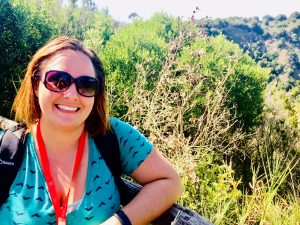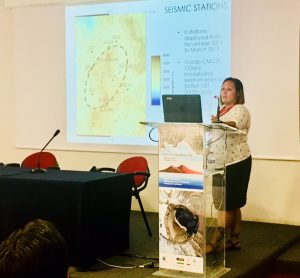
Heather McFarlin’s interest in volcanoes can be traced back to her father, who worked in hard rock drilling and loved science. This early exposure to geoscience followed her to the University of Wisconsin-Whitewater, where she majored in Geography.
“One of the very first homework assignments I had was to look up careers that seemed interesting and find out what it would take to get a job in the field,” McFarlin recalls.
Having always been fascinated by volcanoes, McFarlin looked up jobs that studied them.
“I wanted to work at an observatory monitoring volcanoes and help the people living nearby know what is going on in their environment,” she says. “One of the best ways to monitor a volcano is with seismic instruments, so I decided to become a volcano seismologist.”
Now a University of South Florida Ph.D. candidate, McFarlin uses seismological tools and methods to study sources of volcanic inflation – basically, new lava that pushes up and makes volcanoes bigger – under the Uturuncu volcano in Bolivia and the barely studied Lastarria and Cordón del Azufre volcanoes near the Chile and Argentina border.
When McFarlin found out about Cities on Volcanoes 10 – an annual conference in Naples, Italy that brings together top volcanologists from around the world – it looked like the perfect place to share her research in an international setting for the first time in her career.
It would have also been a chance to network with volcanologists she could learn from or collaborate with.
The only problem? She couldn’t afford it.
“Professional meetings and conferences are expensive, especially for students,” says McFarlin. “Most of us live on or near the poverty line and can barely make ends meet as it is. Going to meetings and conferences takes a huge toll on our finances, but we must attend to network and to get our names out to create the best chances of finding a job once we graduate.”
When she applied for SSA’s Global Travel Grant, she wasn’t sure what to expect.
“Getting a travel grant to any conference is incredibly difficult,” McFarlin says. “You’re often competing against so many other qualified students, or there are limited funds for the grants or limitations on who qualifies.”
But with a strong application, she was selected as a recipient of a $2,000 grant to attend the meeting.
Cities on Volcanoes 10 was everything McFarlin hoped it would be. She presented on a portion of her dissertation characterizing seismic events near the Lastarria and Cordon del Azufre volcanoes, met researchers from different institutions and countries, received valuable advice on her search for a postdoc and toured Naples during intra-meeting field trips.

Perhaps the most memorable moment of the conference came after her presentation, when she was approached by a scientist at an Argentinian volcano observatory who was interested in learning more about her findings.
“He is hoping to start monitoring Lastarria and a few other volcanoes in northern Argentina,” she says. “He wants to stay in touch to further discuss my research in this area.”
“Without this grant, none of this would have been possible,” she says. “I sincerely thank everyone who made this grant a reality, from the financial contributors to the people who facilitated the search process.”
With the meeting behind her, McFarlin turns to her future goals.
“My dream has always been to work at a volcano observatory,” she says, “but honestly, I would be incredibly happy and feel very successful if I could make an impact on people’s lives who live around volcanoes while being able to support my family.”
Thanks to the SSA Global Travel Grant, she’s a little closer to bringing those dreams to life.
Your donations support the future of seismology and make a difference in a student’s life. Donate to SSA today to help send our members to conferences, meetings and other events that allow them to learn, collaborate and network.
